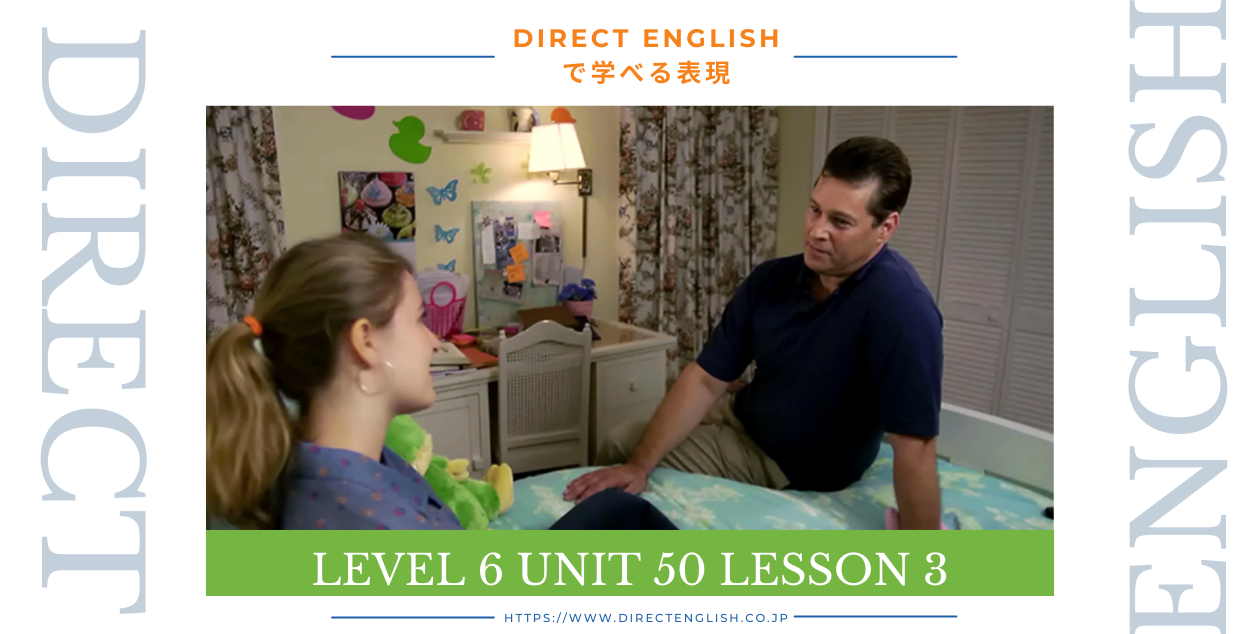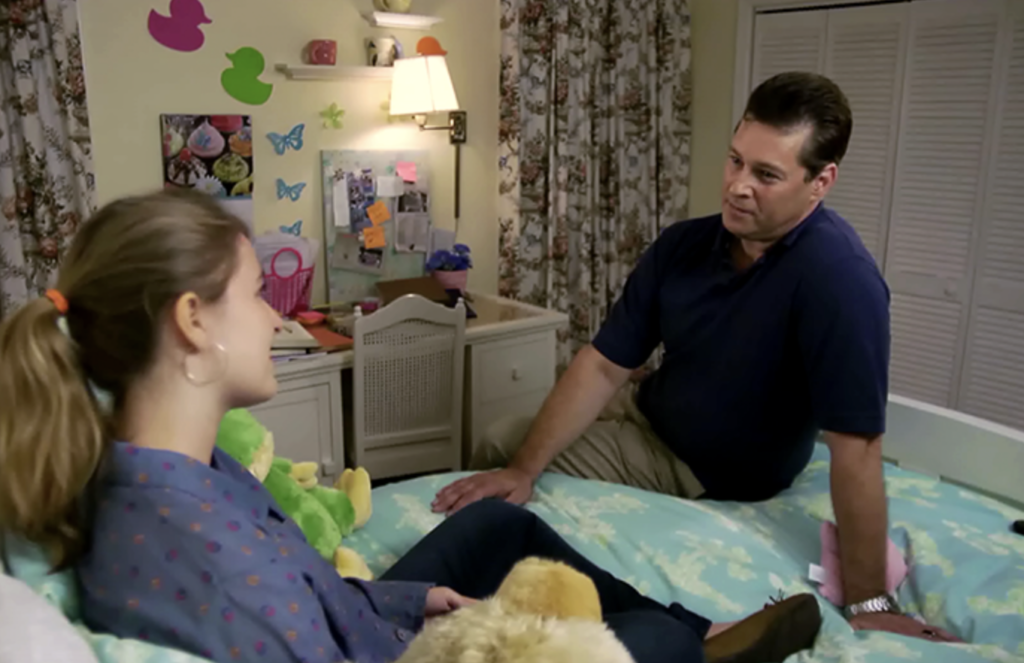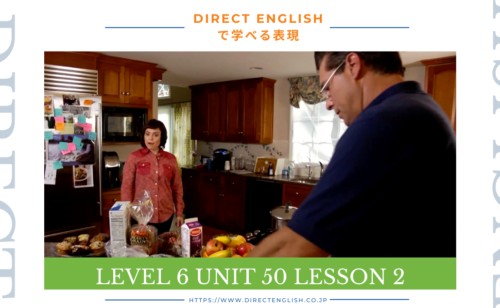
今回のレッスンでは、Richardと娘のBethが心の内を話し合う様子を通じて、親子関係や成長について学びます。Bethは友達と一緒にクロスカントリートリップを計画しており、Richardは彼女の運転経験が不足していることを理由に反対しています。この会話では、親子間のコミュニケーションや成長への配慮がテーマとなります。
1. レッスン3の概要と登場人物
Richardが娘のBethと心の内を話し合います。Bethは友達と一緒にクロスカントリートリップを計画しており、Richardは彼女の運転経験が不足していることを理由に反対しています。

Situation:
Richard is having a heart-to-heart talk with Beth.
Question:
What does she want him to promise?
2. 会話で使われた重要なフレーズと実践的な例文
- 1. Is it OK if I come in?
-
意味:私が入ってもいいですか?
解説:「Is it OK if I」は許可を求める丁寧な表現です。「come in」は動作を表します。
例文:Is it OK if I sit here?
和訳:ここに座ってもいいですか? - 2. We’re going to have to work out when you’re already sixteen, and when you’re only sixteen.
-
意味:私たちはあなたがすでに16歳の場合と、まだ16歳の場合を区別しなければなりません。
解説:「We’re going to have to」は未来の義務や必要性を示し、「already」と「only」で異なる状況を対比します。
例文:We’re going to have to work out how to finish the project on time.
和訳:私たちはプロジェクトを時間通りに終わらせる方法を考えなければなりません。 - 3. I will be worrying about you longer than you want to know.
-
意味:あなたが知りたくないほど長くあなたのことを心配するでしょう。
解説:「I will be worrying」は未来進行形で継続的な動作を示し、「longer than you want to know」は比較表現です。
例文:I will be thinking about you every day while you’re away.
和訳:あなたが留守の間毎日あなたのことを考えるでしょう。 - 4. Some situations worry us more than others.
-
意味:ある状況は他の状況よりも私たちを心配させる。
解説:「Some situations」は特定の状況を意味し、「worry us」は感情を表現します。
例文:Some problems take longer to solve than others.
和訳:ある問題は他の問題よりも解決に時間がかかります。 - 5. You’d be better prepared.
-
意味:あなたはより準備が整っているでしょう。
解説:「You’d」は仮定法で将来の可能性や望ましい状況を示します。「better prepared」は準備が整っていることを意味します。
例文:You’d feel more confident with some practice.
和訳:少し練習すれば、あなたはより自信を持つでしょう。 - 6. The indisputable fact is that you are sixteen.
-
意味:議論の余地がない事実として、あなたは16歳です。
解説:「The indisputable fact is that」は確定的な事実を述べるときに使う表現です。「you are sixteen」は事実を述べるシンプルな現在形の文です。
例文:The indisputable fact is that we need more time.
和訳:議論の余地がない事実として、私たちはもっと時間が必要です。 - 7. I’m sorry it’s such a disappointment to you.
-
意味:あなたにとってそれがそんなに失望させること、ごめんなさい。
解説:「I’m sorry」は謝罪を表す一般的な表現です。「it’s such a disappointment」は失望の原因を指します。
例文:I’m sorry it’s such an inconvenience for you.
和訳:あなたにとってそれがそんなに不便なこと、ごめんなさい。 - 8. You’re just saying that to be nice.
-
意味:あなたは親切であるためにそう言っているのです。
解説:「You’re just saying that」は相手の発言が真意でないことを示し、「to be nice」は行動の目的を示します。
例文:You’re just saying that to make me feel better.
和訳:あなたは私を気分よくさせるためにそう言っているのです。 - 9. When are you going to let me grow up?
-
意味:私を成長させることをいつ許してくれるの?
解説:「When are you going to」は未来の計画や意図について尋ねる表現です。「let me grow up」は「私を成長させる」という意味です。
例文:When are you going to trust me with more responsibilities?
和訳:私に多くの責任を任せることをいつ許してくれるの? - 10. Believe me, honey, soon you’ll be doing things you never thought possible.
-
意味:信じてください、あなたはすぐに想像もできないことをやってくれるでしょう。
解説:「Believe me」は強調表現で、相手に信じてほしい時に使います。「you’ll be doing things you never thought possible」は未来の驚くべき事実を述べる表現です。
例文:Believe me, soon you’ll be traveling the world.
和訳:信じてください、あなたはすぐに世界を旅するでしょう。 - 11. Wrapping me around your little finger.
-
意味:私をあなたの指先で操ること。
解説:「Wrapping me around your little finger」は慣用表現で、相手が自分を完全に操ることを意味します。
例文:You always manage to wrap me around your little finger.
和訳:あなたはいつも私をあなたの指先で操ることができます。
3. 「Parent-Child Communication and Safety Concerns」というテーマでエッセイを書く。
ライティングのコツと準備方法
- 主題を決める:例えば「親子間のコミュニケーション」
- アウトラインを作成:主要なポイントを箇条書きにする
- 具体的な詳細を考える:経験談など具体的な事例
- 学んだ表現を組み込む:レッスンで学んだフレーズを使用する
- 感情や雰囲気を描写する:読者が情景を想像できるようにする
ライティング見本
Title: Parent-Child Communication and Growth
Parent-child communication is crucial for fostering growth and understanding in family relationships. Recently, Richard had a heart-to-heart talk with his daughter Beth about her plans for a cross-country trip. Beth’s persistence and Richard’s concerns highlight the challenges of balancing parental authority with children’s desire for independence.
Richard explained that he would worry about Beth longer than she wants to know, emphasizing the importance of safety and responsibility. Beth responded by asking when he would let her grow up, seeking more autonomy and trust.
In conclusion, effective communication between parents and children requires empathy, patience, and open dialogue. By listening to each other’s perspectives and finding compromises, families can build trust and support each other’s growth.
まとめ:
このレッスンでは、RichardとBethの会話から親子関係や成長について学びました。「You’re just saying that to be nice.」や「When are you going to let me grow up?」など、年齢や経験を説明する表現や成長への期待を示すフレーズが役立ちます。この知識を活用して、親子間のコミュニケーションを深めましょう!

